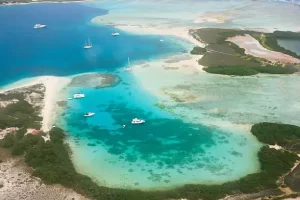Los Roques Archipelago, a dazzling cluster of over 300 coral islands, is one of Venezuela’s crown jewels. Known for its turquoise waters, vibrant marine life, and pristine white-sand beaches, this paradise is a haven for adventurers and relaxation seekers alike.
Essential Information
- Location: Caribbean Sea, north of mainland Venezuela.
- Language: Spanish.
- Currency: Venezuelan Bolívar (VES).
- Time Zone: UTC -4.
- Best Time to Visit: December to April for pleasant weather and optimal water conditions.
Interesting Facts
- Los Roques is a protected national park, ensuring its unspoiled beauty.
- The archipelago is home to some of the healthiest coral reefs in the Caribbean.
- Gran Roque, the largest island, serves as the gateway to the archipelago.
- Los Roques attracts kite surfers and windsurfers from around the globe due to its consistent winds.
- It’s a nesting site for several species of sea turtles, including the green and hawksbill turtles.
How to Get There
- By Plane:
- Fly from Caracas to Gran Roque. Daily flights take approximately 40 minutes.
- By Boat:
- Private charters are available but less common due to the archipelago’s remote location.
- By Tour:
- Guided packages often include transportation, accommodation, and activities.
Best Things to Do
- Snorkeling and Diving:
- Explore vibrant coral reefs teeming with marine life.
- Relax on Cayo de Agua:
- Known for its crystal-clear waters and soft sands.
- Island Hopping:
- Visit nearby islands like Francisqui, Madrisqui, and Crasqui for unique landscapes and activities.
- Kite Surfing:
- Enjoy world-class conditions on the flat, shallow waters around Gran Roque.
- Birdwatching:
- Spot rare seabirds, including flamingos and pelicans, in their natural habitat.
Best Accommodation
- Posadas (Guesthouses):
- Posada La Gaviota: Known for its friendly service and beachfront location.
- Posada Acuarela: Offers colorful decor and a warm, local ambiance.
- Boutique Hotels:
- Hotel Bequevé: A cozy, upscale option with modern amenities.
- Camping:
- Some islands allow camping, offering a unique way to connect with nature. Ensure to follow park regulations.
Good Attractions
- Cayo de Agua:
- Famous for its natural beauty and shallow sandbars.
- Gran Roque Lighthouse:
- Hike to this historic lighthouse for panoramic views of the archipelago.
- Laguna de Rabusqui:
- A calm lagoon ideal for snorkeling and observing marine life.
- Francisqui Beach:
- A family-friendly spot with calm waters and vibrant coral reefs.
Getting Around
- By Boat:
- The primary mode of transportation between islands. Boats can be hired from Gran Roque.
- Walking:
- Gran Roque is small and easily navigable on foot.
- Guided Tours:
- Organized excursions provide seamless access to multiple islands and activities.
Day Trips
- Cayo de Agua:
- Spend a day basking in the beauty of this iconic island.
- Francisqui and Madrisqui:
- Combine these two nearby islands for a mix of snorkeling and beach lounging.
- Fishing Excursions:
- Join a guided trip to catch bonefish, tarpon, and other species.
Practical Tips
- Pack Light: Bring beach essentials like sunscreen, hats, and reusable water bottles.
- Respect the Environment: Avoid touching corals and dispose of waste properly.
- Cash Only: Bring sufficient cash, as ATMs and card facilities are scarce.
- Health Precautions: Carry insect repellent and stay hydrated.
- Local Guides: Hiring local experts enhances the experience and supports the community.
Conclusion
Los Roques Archipelago is a slice of Caribbean paradise that offers unparalleled beauty and tranquility. Whether you’re exploring its coral reefs, relaxing on pristine beaches, or immersing yourself in local culture, this destination promises unforgettable memories. Plan your trip to Los Roques today and experience one of Venezuela’s most extraordinary treasures.

